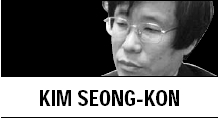When I gave a talk at the State University of New York at Buffalo a few weeks ago, I briefly mentioned my father’s turbulent personal history. During the Japanese occupation, he was arrested by the Japanese police on the charge of being a non-conforming, anti-Japanese political dissident who owned Marx’s “Das Kapital.” He was found guilty and consequently had to spend six months in prison.

After the liberation, my father decided to become an interpreter and worked for the U.S. Military Government. He was a law student, so he could have become a lawyer and enjoyed the social prestige and abundant money that came with the profession. Instead, my father chose to become an interpreter and took the interpreter exam, not the bar exam. Many of his classmates became lawyers and yet, my father, who realized the importance of bridging the gap between Korea and the United States at a time of national crisis, decided to become a cultural mediator.
“What’s the use of practicing the law when the nation in under fire?” He frequently told us, “Misunderstandings between Korea and the States could be disastrous.”
I told the audience that I, too, inherited the spirit of an interpreter from my father. In fact, as someone who majored in American literature, I have devoted my whole life as a cultural mediator between East and West, and between Korea and the U.S. Indeed, I have been a cultural interpreter as director of the American Studies Institute at Seoul National University, president of the American Studies Association of Korea, and professor of American literature and culture. As I unveiled my and my father’s personal history, the American audience seemed to be deeply moved by the unbelievably tumultuous history of Korea.
After the talk, an American professor approached me and told me quite seriously, “You and your father seem to be a living history. You should write memoirs.”
“But in Korea, everybody has a similar history,” I replied in embarrassment. “It’s a shared experience and so my personal history is neither spectacular nor outstanding in Korea.” But how could he understand all the turmoil the Korean people have gone through for the past few decades? He was an American, after all. But he seemed surprised to hear my response. “I feel almost guilty,” he confessed, “that I have led a serene life in this country, not knowing what’s happening out there in the world.”
Aside from my father who is a 92 year-old living history of Korea, I myself also went through much social and political turmoil: the Korean War, the 4/19 student revolution, the 5/16 military coup, the October Yusin (Revitalizing Reform), the emergency decrees in the 1970s, the 12/12 military coup, the 6/29 democratization announcement, the IMF crisis, and so on. All these years, we have been divided into two extremes, antagonizing the opposite side, and indulged in self-righteousness. The country is sadly divided between North and South already and yet, we are still engaged in skirmishes inside the South, sharply divided by East and West, and also by pro-American rightists and pro-North Korean leftists.
In the late 19th century, the first Japanese man who studied in France translated Rousseau’s books into Japanese in order to enlighten his people. Alas! The first Korean who had studied in France assassinated Kim Ok-kyun, the famous reformist of early modern Korea, who insisted on opening and modernizing the nation. Ever since, Korean society has been divided into two antagonizing factions: progressives vs. conservatives; left vs. right; Korean studies scholars vs. Western studies scholars; domestic degree holders vs. overseas degree holders. The list is endless.
It seems that Koreans cannot learn from history and always repeat it. George Santayana once wrote: “Those who cannot learn from history are condemned to repeat it.” Winston Churchill, too, said, “Those who fail to learn from history are doomed to repeat it.” Indeed, those who fail to learn from the mistakes of history are sadly destined to repeat them. Unfortunately, we are hopelessly repeating the follies of our predecessors.
I did not tell my American audience, but in fact, my father was arrested because his fellow Korean colleagues were snitches for the Japanese police. They were jealous because my father, who spoke fluent English and Japanese, was promoted quickly ahead of them. My father was also disillusioned about being a lawyer whose main concern was about how to extract more money, rather than how to defend his defendants, even in times of national crisis.
With the predicament of today’s Korean society, my father is still deeply disillusioned.
“Nothing seems to have changed,” he often mutters in dismay, “especially when it comes to our politicians.” But he is so proud of the remarkable economic success of his country, because as living history, he has witnessed all the miseries and the painful poverty the Korean people have experienced throughout the 20th century.
“Living in Korea has always been tough and dramatic,” my father often told me. “But it’s been exciting as well, because we’ve never given up hope.”
By Kim Seong-kon
Kim Seong-kon is a professor of English at Seoul National University and director of the Korea Literature Translation Institute. ― Ed.








